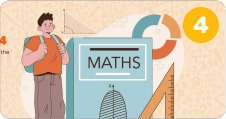The William Lowell Putnam Mathematical Competition, commonly referred to as the Putnam Competition, is one of the most prestigious university-level mathematics competitions in the United States and Canada.
This is a comprehensive guide that covers the history, structure, preparation strategies, and significance of the Putnam Competition.
History of the Putnam Competition
The Putnam Competition was established in honor of William Lowell Putnam, a Harvard graduate and advocate for the development of mathematical talent in the United States. The first competition was held in 1938, organized by the Mathematical Association of America (MAA), to stimulate healthy competition and encourage creative problem-solving among university students.
Over the decades, the Putnam Competition has gained a reputation for its rigorous problems and for identifying and nurturing mathematical talent. Many of its participants have gone on to achieve significant success in academia, industry, and beyond.
Date:
It is an annual event that takes place on the first Saturday of December.
Website:
Mathematical Association of America (MAA)
Eligibility:
Full-time undergraduate students in the United States and Canada who have not yet received a college degree.
Registration Deadline:
Early October each year
Format:
12 challenging problems, divided into two 3-hour sessions
Prizes:
- Cash prizes for the top five teams range from $5,000 to $25,000.
- Cash prizes for the top five students honored as Putnam Fellows are $2,500 each.
- Other top students also receive prizes for their performance in the Putnam Mathematical Competition.
Structure of the Competition
It consists of two 3-hour sessions, one in the morning and one in the afternoon, with a break in between. Each session presents six challenging problems, making a total of twelve problems. Participants work individually and submit written solutions for evaluation.
Recommended Reading: Math Competition for Kids
Scoring
Each problem is worth 10 points, leading to a maximum possible score of 120 points. The problems are designed to test a range of mathematical skills, including algebra, combinatorics, geometry, and number theory. Scoring is extremely tough, and a median score of zero is not uncommon, highlighting the competition’s difficulty.
Preparation Strategies
Preparing for the Putnam Competition requires a deep understanding of various mathematical concepts and the ability to solve problems creatively and efficiently. Here are some strategies to help students prepare:
1. Study Past Problems:
Reviewing problems from previous years is essential. This helps in understanding the types of questions asked and the level of difficulty.
84th Putnam Competition Problems A Session- https://maa.org/sites/default/files/Programs/2023Putnam_A.pdf
84th Putnam Competition Solutions A Session-
https://maa.org/sites/default/files/Programs/2023_Putnam_Solutions_A.pdf
84th Putnam Competition Problems B Session-
https://maa.org/sites/default/files/Programs/2023Putnam_B.pdf
84th Putnam Competition Solutions B Session-
https://maa.org/sites/default/files/Programs/2023_Putnam_Solutions_B.pdf
2. Join a Study Group:
Collaborating with peers can enhance learning. Study groups allow students to discuss problems, share different approaches, and motivate each other.
3. Take Advanced Mathematics Courses:
Courses in abstract algebra, real analysis, and combinatorics can provide a strong foundation for tackling Putnam problems.
4. Practice Regularly:
Consistent practice is crucial. Setting aside regular time for problem-solving can help in building the necessary skills and stamina for the competition.
5. Seek Guidance from Professors:
Many universities have faculty members who have experience with the Putnam Competition. Seeking their guidance can provide valuable tips and insights.
Recommended Reading: Pros and Cons of Math Competition
Conclusion
The Putnam Mathematical Competition and its challenging problems, rich history, and the prestige associated with it make it a unique and invaluable experience for university students passionate about mathematics. Whether you’re aiming to compete or simply interested in the world of high-level problem solving, the Putnam Competition offers a fascinating glimpse into the beauty and complexity of mathematics.
Want to excite your child about math and sharpen their math skills? Moonpreneur’s online math curriculum is unique as it helps children understand math skills through hands-on lessons, assists them in building real-life applications, and excites them to learn maths. You can opt for our Advanced Math or Vedic Math+Mental Math courses. Our Math Quiz for grades 3rd, 4th, 5th, and 6th helps in further exciting and engaging in mathematics with hands-on lessons.
Moonpreneur understands the needs and demands this rapidly changing technological world is bringing with it for our kids. Our expert-designed Advanced Math course and Math Quiz for grades 3rd, 4th, 5th, and 6th will help your child develop math skills with hands-on lessons, excite them to learn, and help them build real-life applications.
Register for a free 60-minute Advanced Math Workshop today!












